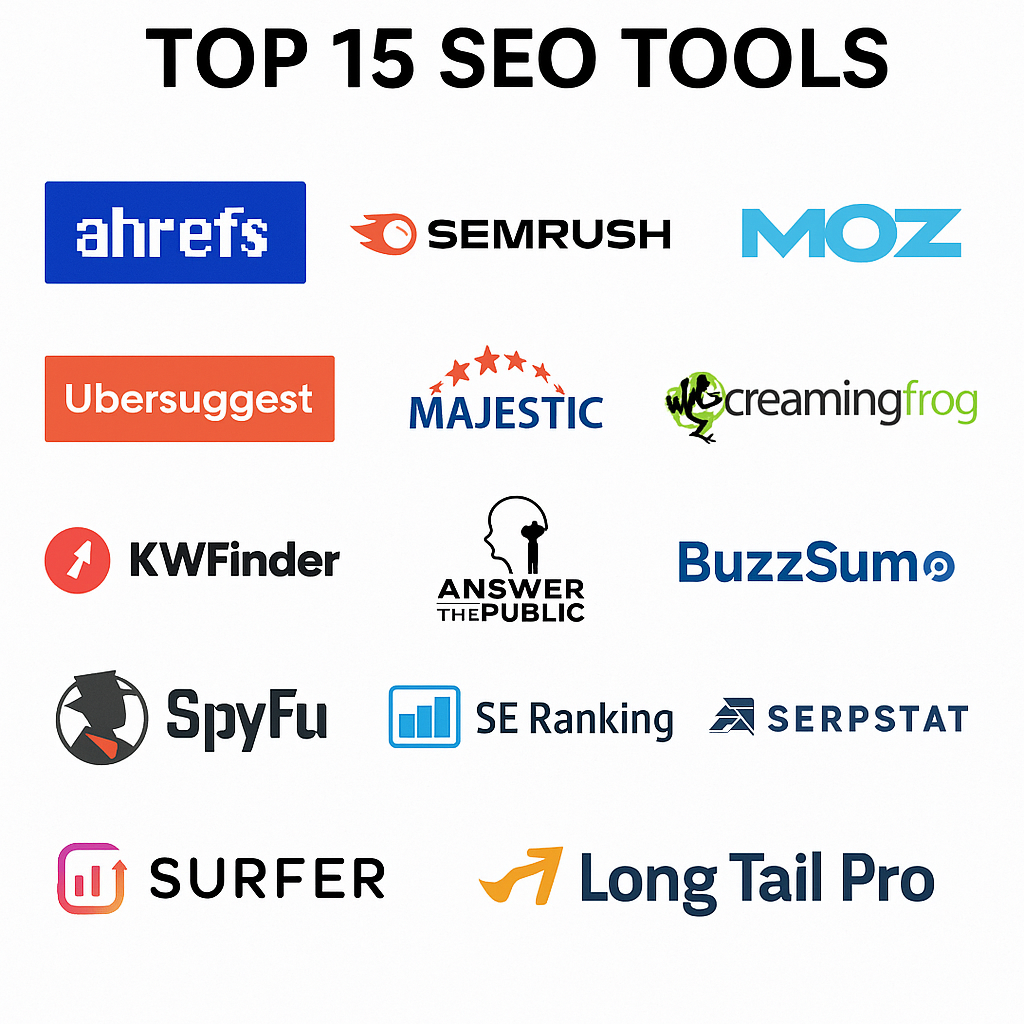Introduction
Top 15 SEO Tools in 2025: Search Engines Optimization tool is a collection of online software used by web masters. Search engines optimizers to increase the ranking of a website on search engines such as Google, Bing and Yahoo. Equipment helps with different performance areas for a website, such as key order, quality of material, side speed and technical SEO in analysis, tracking and adaptation.
SEO tools come in so many different forms-something are designed to be specialized for keyword research, website audit , competitive audit or link-bed strategy. They provide good details about the performance of a website and drive more organic traffic, rank better in search results and develop a competitive advantage in the digital world.
SEO Tools for 2025
1.SEMrush
Semrush is essentially the synonym of SEO. This rank tracker’s features and insights are powerful and scalable enough to cater to nearly all the performance tracking requirements of SMBs and enterprises.
There is very little that Semrush cannot do, but most of its usefulness serves keywords, SERP analysis, and page ranking metrics. Its very detailed dashboard with customizable widgets provides a complete overview of how well a monitored domain is doing as far as metrics such as authority, backlinks, traffic, organic keywords, and average time on site. You can drill down further into these in their respective widgets, or turn them into reports. As a rank tracker, the majority of Semrush’s functionality exists between the keyword and SERP tracking spectrum, so it doesn’t have some of the in-depth content optimization abilities found in other tools on this list. Semrush does have extra extensions available that can fill in some of those gaps, such as its free AI Writing Assistant app. Additionally, it supports integration with quicklinks, greatly expanding its integration and automation feature set.
2.Ahrefs
If Semrush isn’t your cup of tea, Ahrefs fills a very comparable niche in the SEO toolset as a high-end rank tracker with somewhat lower-priced subscription tiers. It’s also my favorite tool for competitor research.
As a rank tracker, Ahrefs shares much of the same functionality as Semrush. You can track individual webpages or domains to observe how they rank for keywords over time, conduct site audits, and delve into historical ranking data with customizable charts. It also has some nice bonus features, such as Web Explorer, which will display ranking statistics for pages on the web for specified keywords.
As a competitor research tool, Ahrefs is far more valuable than tools on this list that are content optimization- and keyword research-focused, and I believe it has a tiny advantage on Semrush on this as well. Its Content Gap tool will be able to display for you a comprehensive comparison of keywords that specific competitors are ranking for, and what SERP features they’re dominating, such as Google image packs. I also appreciate the Link Intersect tool that tells you on which pages your competitors are getting links.
3.Surfer
Surfer is (Top 15 SEO Tools in 2025) among the more unusual tools on this list. It’s mostly an SEO audit tool, but because of its levels of insight, it’s super helpful for keyword research, too. But what will get lots of users going to be its strong AI offerings.
Surfer provides a deceptively straightforward set of five tools: Keyword Research, Content Editor, Audit, Domain Planner, and SERP Analyzer. At first glance, these are essentially the same kinds of tools you’ll get in most other products. Surfer makes them more useful, however, by easily incorporating AI.
If all that AI functionality isn’t sufficient, Surfer includes native AI writing features with no extra expense. The Essential plan offers five AI articles monthly, and the Scale plan provides 20 AI articles monthly. For those who don’t care about article restrictions, Surfer also includes integration with Quicklinks to turn your content creation into über (artificially) intelligent. On top of the massive subscription fee, Surfer is certainly a high-end tool, but one that’s very much worth the expense.
4.Yoast SEO
Yoast SEO (Top 15 SEO Tools in 2025) is used to enhance your WordPress website’s technical and on-page SEO. There is a paid version, but the free plugin is ideal for much beginner SEO requirement.
Yoast SEO assists you in having control over how your content material is displayed in the search results.

Following are some things you can do using it:
- Insert your page target keyword so that the page is optimized for it
- Make your title tag and meta description the ideal length and containing the correct keywords
- Make your URL slug SEO-friendly and more readable
- See exactly how your page will appear in search results on mobile and desktop devices
- Yoast SEO reviews your content as you work. It provides you with direct tips to improve it, in the WordPress editor itself.
The tool ensures your content is error-free regarding:
- Unbalanced distribution of keywords in your content
- External links and images missing
- Your target keyword missing in your introduction
- Once you upload the sitemap to Google Search Console, the plugin automatically updates it. This is done every time you add a new page to your website.
5.Mangools
Five integrated tools that manage to simplify SEO without dumbing it down:
- Finder focuses on the basics such as the search volume, and suggestions for the search volume, keywords difficulty and long -to -long keywords.
- SERP checker lets you tell you how difficult the competition for your targeted keyword is. It provides insight into matrix such as domain authority, side authority and feedback profile for the top ranking pages.
- SERP Watcher tracks how your situation changes over time and sends you a warning for important movements, so you are always in the loop of your SEO performance.
- Link mines allow you to dissect the rivals to your rivals to highlight valuable link options to your site.
- Site profiles provide a comprehensive observation of SEO calculations on any website, including the domain authority, the stream of trust and even the Alexa ranking.
6.Clearscope
If you’re a fan of Surfer’s content editor that’s powered by AI, then Clearscope will be your cup of tea. Perhaps the most targeted SEO tool on this list, Clearscope’s functionality is devoted nearly solely to content optimization.
Clearscope’s interface is structured slightly differently than most software. Its strength isn’t keywords or links, but reports. You begin by entering a keyword into a report, which pops up the content optimization interface. Clearscope ranks all of these options by relevance and frequency of occurrence in posts that rank for your target keyword. The interface for editing content is nice enough, with the standard text editing tools. WordPress and Docs integration, and the highlighting of your target keyword in the body.
You can also switch the keyword tab with a research tab for more questions and citations, as well as an outline tab that deconstructs the post structure for competing posts. The term map interface is really cool, providing a visual representation of the related keywords your competitors use.
7.SEO Clarity
seoClarity is as (Top 15 SEO Tools in 2025) close to an all-in-one tool as it comes. With a broad array of both general SEO and content optimization capabilities. AI assistant, it can probably replace a number of other tools for many users.
On the SEO analysis side, seoClarity does a lot of what these other tools do. It has rank tracking, search trend data, actionable diagnostic data, performance scoring, page error and inefficiency detection, competitor research.. For this particular purpose of analysis, Ahrefs and Semrush are slightly more comprehensive because they’re virtually entirely focused on it. SeoClarity still manages to stand out, especially by incorporating the types of on-page analysis functionality you find in audit-focused tools such as SEOptimer and Surfer. To all those tools, seoClarity also offers an equally robust set of content optimization and creation tools. Similar to Clearscope, you can convert keywords that were discovered by research. Ideation features to blog posts within the platform.
8.SEOptimer
SEO auditing tools are much like therapists, they can let you know there’s something amiss. But it’s pretty much your call to correct the problem. SEOptimer “Top 15 SEO Tools in 2025” offers expertise in finding SEO-related issues with a website or individual webpage along with a few simple tools.
Simply insert a webpage into the dashboard of SEOptimer, and you will get a clean line of performance. Provides you with an overview of where your page may be losing traffic based on-page SEO indicators, backlinks, overall performance.
These suggestions are mostly thoughtful, specific, and actionable, which is the suggestion trifecta. That A-social presence, for instance, is a result of having no connected Instagram account and no Facebook Pixel code, which allows for Facebook ad retargeting (non-applicable solutions to that blog post, but nonetheless useful to know). The Performance score is particularly useful, with detailed load speed analysis and highlighting particular items such as image compression, JavaScript errors, and image optimizations that can be causing those speeds to suffer.
9.SE Ranking
If you’re attempting to rank for “best pizza near me” rather than “best pizza recipes,” you require a tool that gets the subtleties of local SEO. SE Ranking is an integrated SEO tool well-suited for small to medium-sized businesses looking at local search optimization. It finds that optimal balance of being both feature-rich and accessible—something that’s rather uncommon in the local SEO arena.
The platform features a location-based rank tracker that allows you to create many tracking points along a map and track how your rankings change by location. I love that you can designate typical keywords that track everywhere and point-specific keywords to track specific areas. This is perfect for companies covering multiple service territories, as you can track exactly how your rankings change in different areas.
Another hat tip to SE Ranking is its Google Business Profile tracking. This tool tracks all the key metrics such as search appearances, website visits, direction requests, and calls in one location. And any profile changes you make in SE Ranking automatically sync to your Google Business Profile, which is a huge time-saver when dealing with multiple locations.
10. Moz Pro
Strengths: Keyword explorer, site crawl, on-page suggestions
Best for: Beginners and mid-sized businesses
11. Ubersuggest
Strengths: Keyword ideas, traffic analyzer, site audit
Best for: Small businesses and freelancers
12. Serpstat
Strengths: Rank tracking, site audit, backlink analysis
Best for: Agencies and growth hacking
13. GTmetrix / PageSpeed Insights
Best for: Page load optimization
Strengths: Speed and performance insights
14. Majestic SEO
Best for: Link audits and historical backlink data
Strengths: Link intelligence, Trust Flow & Citation Flow
15. Screaming Frog SEO Spider
Strengths: Site crawling, broken links, metadata audit
Best for: In-depth technical site audits


